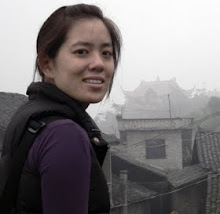I get a lot of questions about how Lonely Planet authors research their guidebooks. The most common question is whether we actually visit every site. Yes, absolutely. That's the rule.
We all follow our editors' guidelines, which are laid out in a hundred-page brief and then further honed through discussions among the editors and all the authors. For example, over the past month, we've been working out how to best convey the fact that internet bars in certain provinces are now closed to those without a Chinese ID. Then there are the official LP style
and product manuals, another few hundred pages long, which cover things like when to mention air conditioning and how to write with a voice but not like an imperialist. And there are the BBC
journalistic principles, which cover ethical and environmental considerations.
I should say here that the policy at Lonely Planet is to never
request or accept freebies. So, if you are the manager of an
all-you-can-eat seafood buffet and a guy asks you to send over free
pitchers of beer because he works for Lonely Planet, the guy does not
work for Lonely Planet. (I feel the need here to say that stealing is wrong. It hurts hard-working folks trying to
make a decent living. Anyway, if you can afford to travel, you can afford to
pay for your own beer. )
As for the nitty-gritty of collecting and filtering information, each Lonely Planet author tackles it his or her own way.
When I arrive in a town, I start by visiting all of the sites in the preceding editions and move on from there. So, this means stopping by all eighty internet bars, hospitals, ticket sales offices, and post offices that are listed and those anywhere near a listed site. At the same time, I do internet research, read the newspaper, and ask around about things that have cropped up in the past few years.
When I talk to the owners or front desk, I never offer upfront why I'm so interested in their business hours or full address. Not many regular people here in China know what Lonely Planet is anyway, and when they do, my visit becomes an official tour with too much tea and too many brochures.
There's a cultural element to this. Different levels of openness are required when approaching folks in different parts of the country, for example, northern versus southern Chinese. The way of the south is for your host to accept the uncertainty and play along, perhaps prying along the way. In the north, your host expects you to be upfront with your intentions if you want anything more than a one word answer. So, in the Hong Kong, if asked, I'd explain vaguely that I'm writing a book for Western travelers. In Qingdao, if I got awkward pauses, I'd offer up that information.
Take hotels. My general method with the top-end ones is to play the role of the disorganized tourist, so that I can avoid the PR rep. What types of rooms are available? What are each of their prices and amenities? What's the price if, say, I bring my friend with me in March? Oh wait, I forgot, she has a son, so what would be the cost if we needed a third bed? Oops, did I mention I needed a non-smoking room in July? Let's try all of those scenarios now applying any available discounts. And so on. With the cheap hotels, I tend to get more complete information if I explain the info is for a tourist book. In all cases, I ask to see the rooms. This takes a while. I open drawers, sit on the beds, and turn on the faucets. I ask the puzzled hotel employee when the room was last renovated and when it will be again. If I can, I'll get something to eat at the hotel restaurant. I'll try and stay in a different hotel each night, so that I can get a real look into whether the fruit basket is fresh, the floors creak, and the staff stocks ibuprofen. This all takes a lot of time, and I probably cut half of the hotels from my final write up.
Overall, I've found the most useful thing to do when researching is to talk to anyone and everyone who doesn't run away fast enough. It's the age-old trick of journalists everywhere, and it still is the only way to get the real story. And I never copy and paste what I find already in print. A lot of that stuff is cribbed from Lonely Planet anyway.
This is the sort of photo that I take while visiting sites. I also have a lot of fascinating snaps of restaurant menus, of course.
Sometimes I'll take a picture like this one, and suddenly another person will be next to me taking the same shot. Who cares about the gorgeous beach in the background?


































